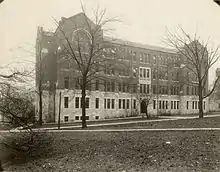William Henry Calhoun
William Henry Calhoun (1815-1865) was an American silversmith in the Antebellum South. He was trained in Philadelphia and became a jeweler in Nashville, Tennessee, where he designed silverware in the 1830s-1860s. A Grand Master of the Odd Fellows, he was arrested by the Union Army for his Confederate support in 1863. His work can be seen at the Tennessee State Museum and the Museum of Early Southern Decorative Arts.
William Henry Calhoun | |
|---|---|
| Born | 1815 Pennsylvania, U.S. |
| Died | 1865 |
| Occupation | Silversmith, jeweler |
| Spouse(s) | Mary Pickless |
| Children | Mary Ella Calhoun Foote |
Early life
Calhoun was born in 1815 in Pennsylvania.[1] His paternal grandfather, Robert, emigrated from Ireland with family, and his father Hugh was born on their voyage to America in 1789.[2] Calhoun was of Scotch-Irish descent; his family had been silversmiths for generations in Ireland.[2] Calhoun moved to Nashville, Tennessee with his parents before 1812, and his father returned to Pennsylvania to serve in the War of 1812.[2] After the war, the family moved to a farm in Ohio, where Calhoun's his younger brother, George Reid Calhoun, was born.[2]
Calhoun was "trained as a silversmith in Philadelphia."[1]
Career
Calhoun returned to Nashville in 1835, where he managed his father's jewelry store at 16 Public Square.[1][2] He sold Deringer pocket pistols.[3] He designed cups for agricultural fairs like the one held by the Tennessee State Agricultural Society of Gallatin in 1855.[1] He also designed cutlery like salt spoons,[4] and tea sets including "pitchers, goblets, julep cups, ladles, flatware."[2] Confederate General Robert H. Hatton owned silverware designed by Calhoun.[5]
By 1860, Calhoun was worth "$84,300 in real property and $40,000 in personal property."[1] During the American Civil War, Calhoun was a supporter of the Confederate States of America.[6] In February 1863, he was arrested for his Confederate support on the order of Union Brigadier General Robert Byington Mitchell pending the release of Union prisoners.[6][7]
Calhoun resumed his activity as a jeweler in 1865.[8]
Personal life, death and legacy
Calhoun married Mary Pickless; they had a daughter, Mary Ella Calhoun, who later married Robert Foote in 1888.[9] Calhoun was the Grand Master of the Odd Fellows Grand Lodge of Tennessee in 1845.[10][11]

Calhoun died in 1865.[1] His wife died in 1891.[12] His brother took over his store and acquired a farm on 21st Avenue; it later became Hillsboro Village.[2] Calhoun's portrait, done by Washington Bogart Cooper, was given to the Odd Fellows' Grand Lodge in 1896.[11] His daughter Mary bequeathed her estate to Vanderbilt University for the construction of Calhoun Hall in 1918.[1] Even though the will was challenged in court by her heirs,[13][14] the university won in 1924[15] and the building was completed in 1928.[16]
Calhoun's cutlery is in the collections of the Tennessee State Museum as well as the Museum of Early Southern Decorative Arts.[1][2][4] His work was auctioned by Christie's in 2008.[17]
Further reading
References
- "Cup. Artist/Maker: Calhoun, William Henry". Museum of Early Southern Decorative Arts. Retrieved April 22, 2018.
- Davis, Louise (August 14, 1983). "Early Silversmiths Left Marks on City. Names of Elliston, Calhoun Figure Big in Nashville History". The Tennessean. pp. 93–94. Retrieved April 14, 2018 – via Newspapers.com.
- Shideler, Dan (2011). 2012 Standard Catalog of Firearms: The Collector's Price & Reference Guide. Iola, Wisconsin: Krause Publications. p. 385. ISBN 9781440216886. OCLC 798902012.
- "Pair of Salt Spoons: Artist/Maker: Calhoun, William Henry". Museum of Early Southern Decorative Arts. Retrieved April 23, 2018.
- Caldwell, Benjamin Hubbard (1988). Tennessee Silversmiths. Winston-Salem, N.C.: Museum of Early Southern Decorative Arts. pp. 49–53. ISBN 9780945578017. OCLC 837245410.
- "NEWS FROM NASHVILLE.; Two Wealthy Rebels Arrested as Hostages The Cumberland Cleared of Rebels. Connecticut Democratic State Convention". The New York Times. February 19, 1863. Retrieved April 22, 2018.
- "Special Orders No. 46". The Nashville Daily Union. February 28, 1863. p. 3. Retrieved April 23, 2018 – via Newspapers.com.
- "A Magnificent Watch". The Nashville Daily Union. August 22, 1865. p. 3. Retrieved April 23, 2018 – via Newspapers.com.
- "Mary Ella Calhoun Foote". FamilySearch. Retrieved April 23, 2018.
- "Odd Fellowship in Tennessee. Tennessee Lodge, the First in the State. Instituted in June, 1839. Over a Thousand Initiations. First Hall of the Order of Tennessee--List of the Grand Masters Up to the Present Date". The Tennessean. May 2, 1897. p. 17. Retrieved April 23, 2018 – via Newspapers.com.
- "An Old Nashville Man. W.H. Calhoun's Portrait Presented Odd Fellows' Grand Lodge". Nashville Union and American. March 19, 1896. p. 2. Retrieved April 23, 2018 – via Newspapers.com.
- "Died in New York". The Tennessean. December 27, 1891. p. 3. Retrieved April 23, 2018 – via Newspapers.com.
- "Foote Will Case Decision Reserved. Court of Civil Appeals Remands to Lower Court. Will Be Appealed". The Tennessean. February 27, 1921. p. 6. Retrieved April 23, 2018 – via Newspapers.com.
- "Will Verdict Reversed. Suit Over $125,000 Bequeathed to Vanderbilt University". Evening Star. February 28, 1921. p. 5. Retrieved April 23, 2018 – via Newspapers.com.
- "Vanderbilt Gets Foote Bequest, But Disposition Awaits Board's Action. Trustees Probably Will Decide on Disposition of $150,000 Memorial Fund, June 9". The Tennessean. February 19, 1924. pp. 1–2. Retrieved April 23, 2018 – via Newspapers.com.
- "Buildings Bear Leaders' Names. Garland, Buttrick and Calhoun To Be Honored at Vanderbilt". The Tennessean. March 25, 1928. p. 7 – via Newspapers.com.
- "Important American Silver: A SILVER CUP OF SOUTHERN INTEREST MARK OF W. H. CALHOUN, NASHVILLE, TN, CIRCA 1846". Christie's. Retrieved April 23, 2018.